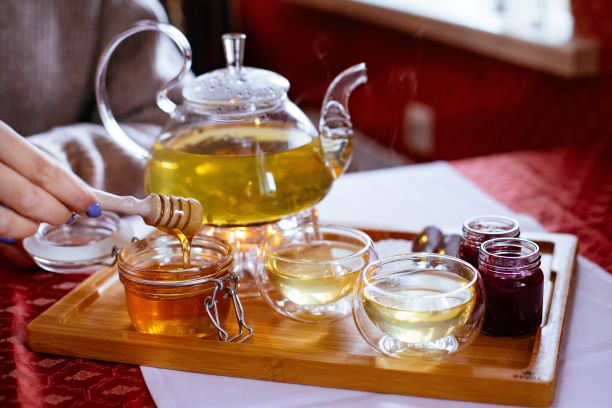What Is Ceylon Tea?
Ceylon tea refers to tea produced in the highlands of Sri Lanka — formerly known as Ceylon.
Ceylon tea, also known as Sri Lankan tea, is primarily grown in the country of Sri Lanka, which is located in South Asia. Sri Lanka is renowned for its tea production and is one of the world’s largest tea exporters. The country’s varied climate and elevations contribute to the unique flavors and characteristics of Ceylon tea.
The benefits of Ceylon Tea include:
- Rich flavor: Ceylon tea is known for its brisk and bold flavor, which can vary depending on the region where it’s grown and the elevation at which it’s cultivated. It can have a variety of tasting notes, including citrusy, malty, floral, and even spicy flavors.
- Antioxidants: Like other types of tea, Ceylon tea contains antioxidants, such as catechins and flavonoids. These compounds may help protect cells from damage caused by free radicals and contribute to overall health.
- Potential health benefits: Drinking Ceylon tea in moderation may be associated with various health benefits, including improved heart health, better digestion, and reduced risk of certain chronic diseases. Some studies suggest that tea consumption may also be linked to improved cognitive function and weight management.
- Caffeine content: Ceylon tea typically contains caffeine, which can provide a mild energy boost and improve alertness. The caffeine content may vary depending on the type of Ceylon tea and how it’s prepared.
- Variety: Ceylon tea comes in various forms, including black, green, and white teas. The type of tea and its processing method can influence its flavor profile and potential health benefits. For example, black Ceylon tea is the most common type and is known for its bold, robust flavor.
- Aromatic qualities: Ceylon teas are often prized for their aromatic qualities, with many offering pleasant and fragrant aromas that can enhance the overall tea-drinking experience.
It’s important to note that while Ceylon tea can offer health benefits, excessive consumption of tea, particularly with high caffeine content, may have adverse effects on some individuals, such as insomnia, anxiety, or digestive issues. It’s recommended to enjoy Ceylon tea in moderation as part of a balanced diet for the best results.

What are Huckleberries?
Huckleberries are small, round, and dark-purple berries that belong to the Vaccinium genus.
They are similar in appearance to blueberries and are often confused with them, but they have a distinct flavor. Huckleberries are primarily grown in North America, particularly in the Pacific Northwest region of the United States and parts of Canada.
Here are some key points about huckleberries:
- Geographic distribution: Huckleberries are native to North America and can be found in regions such as the Pacific Northwest, including states like Washington, Oregon, Idaho, Montana, and parts of British Columbia in Canada. They also grow in some mountainous areas of the western United States.
- Varieties: There are several species of huckleberries, including the mountain huckleberry (Vaccinium membranaceum) and the red huckleberry (Vaccinium parvifolium). Each variety may have slightly different flavors and characteristics.
- Culinary uses: Huckleberries are known for their sweet-tart flavor and are used in a variety of culinary applications, including pies, jams, syrups, muffins, and pancakes. They can also be enjoyed fresh when in season.
- Nutritional benefits: Huckleberries are a good source of antioxidants, vitamins, and minerals. They are rich in vitamin C, vitamin K, and dietary fiber. Antioxidants in huckleberries, such as anthocyanins, are believed to offer various health benefits, including reducing oxidative stress and inflammation.
- Health benefits: Some potential health benefits associated with consuming huckleberries include:
- Antioxidant protection: The antioxidants in huckleberries may help protect cells from damage caused by free radicals.
- Heart health: The fiber in huckleberries can aid in maintaining heart health by reducing cholesterol levels and supporting healthy blood pressure.
- Cognitive function: Some studies suggest that antioxidants in huckleberries may have a positive impact on cognitive function and brain health.
- Seasonality: Huckleberries are typically in season during the late summer and early fall, depending on the region. They are often foraged in the wild, but some farms also cultivate them.
- Culinary delicacy: Huckleberries are considered a regional delicacy in the Pacific Northwest, and they are highly sought after for their unique flavor and limited availability.
It’s important to note that while huckleberries offer nutritional benefits, their availability can be limited, and they may not be as widely cultivated as other berries like blueberries. If you have access to huckleberries, they can be a tasty and nutritious addition to your diet when in season.


